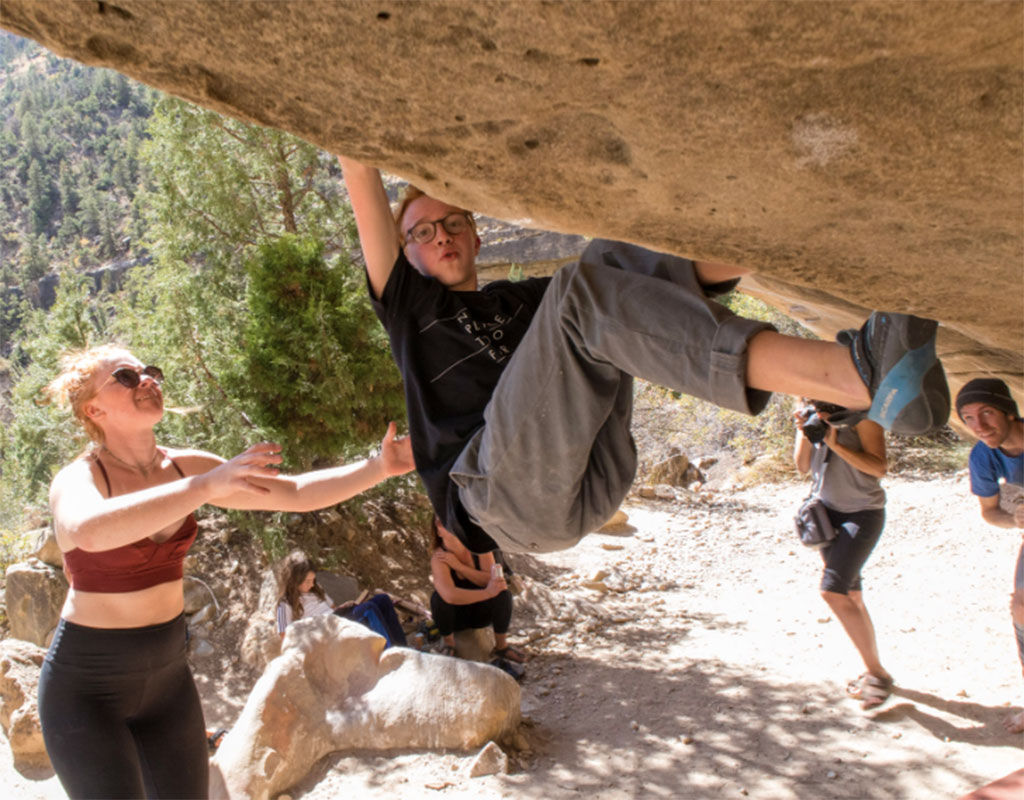This op-ed reflects the opinions of Tom Adams, Utah’s director of outdoor recreation.
Just as desert temperatures started to dip this September, more than 400 climbers descended on Castle Dale, Utah, for the fifth annual Joe’s Valley Bouldering Festival. This sudden influx of people caused the town’s population of around 1,500 to increase by nearly one-third over the weekend. Although most visitors were there to enjoy the outdoors, they also had a lasting impact on Castle Dale’s economy.
For decades, the small, rural Utah town’s primary economic driver has been coal mining and the nearby Huntington and Hunter power plants. However, in recent years, residents noticed a large number of climbers from around the globe visiting every spring and fall to attempt the countless bouldering problems located on the hundreds of miles of public lands near the town. Instead of turning a cold shoulder to these new visitors, they partnered with forward-thinking event organizers Steven Jeffery and Adriana Chimaras to launch an annual bouldering festival, creating a new opportunity for the town’s economy.

Climbers at the 2019 Joe’s Valley Bouldering Festival. (Photo Credit: Nikki McGee, Elevated Mountain Guides)
After just a couple of years, Castle Dale’s economy now benefits from climbers as they spend more than $600,000 annually in the area. This boost wouldn’t have been possible without residents creating new restaurants, Airbnb rentals and coffee shops to accommodate the climbers.
Castle Dale is a model for hundreds of small, rural communities across the country looking to diversify their economies. Instead of doubling down on existing industries, the rural community turned one of its overlooked strengths—outdoor recreation on public lands—into a new economic driver.
To keep young people from relocating to more urban areas in search of job opportunities, and to attract new visitors, communities need to look at how outdoor recreation can transform their local economy. The U.S. outdoor recreation industry employs 7.6 million people and generates $887 billion in consumer spending annually, according to the Outdoor Industry Association. Although some of these jobs are seasonal like guides and outfitters, many, like jobs in hotels and restaurants, are more permanent.
In addition to providing local jobs, outdoor recreation improves the quality of life for existing residents and supports healthy living. Numerous studies show outdoor recreation can help with everything from reducing blood pressure to improving memory. When states promote outdoor recreation, this can incentivize communities to better protect public lands and improve access for future generations.
A county with recreational opportunities typically attracts more new residents, and has higher incomes and faster earnings growth, especially for rural and small cities, a recent study by Headwaters Economics found. This is because companies and site surveyors want to build offices where employees will be happy and have opportunities to enjoy the great outdoors. Just look at Utah.
In 2013, Utah created the first statewide Office of Outdoor Recreation to focus on recreation management, support recreation businesses, influence strong state policy and inspire Utahans to recreate. Since then, the state has enjoyed a number of successes from corporate recruitment to large investments in recreation infrastructure. These victories have supported rural areas like Joe’s Valley, along with gateway communities like Moab and Springdale, which both see 3 to 5 million visitors a year.
Today, 16 states have created offices that are devoted to promoting outdoor recreation. While every state is unique, these offices share a commitment to conservation, improved stewardship of public lands, sustainable economic development and improving the quality of life for the people in their state, which is why every state should create a comparable office.
With the right steps and commitment from local leaders, thousands of communities across the country can benefit from outdoor recreation. Every city, county and state has outdoor recreation opportunities that should be promoted and protected. When leaders focus on economic development that prioritizes people, public lands and sustainable industries, everyone wins.


